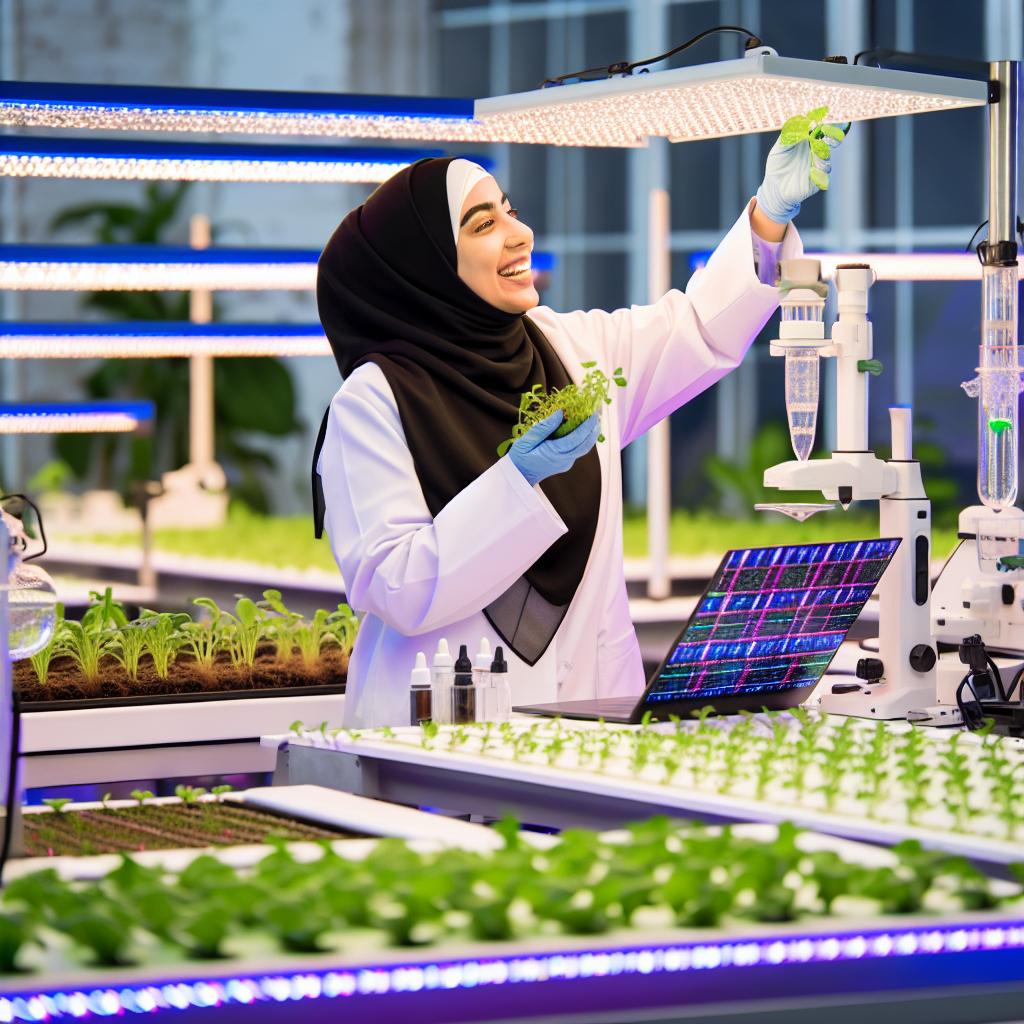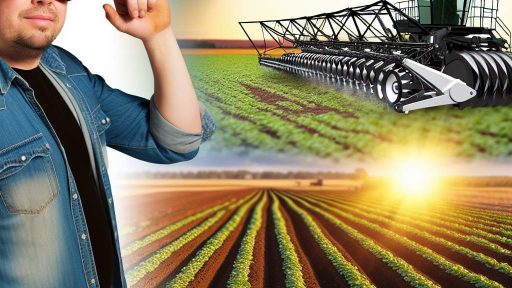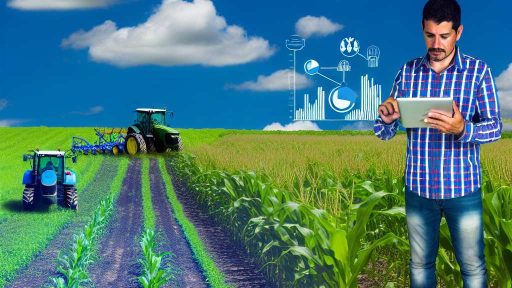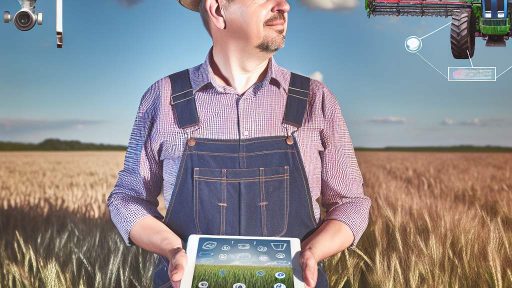Introduction to Biotechnology in Agriculture
Biotechnology significantly reshapes modern farming practices.
This field applies scientific advances to improve agricultural production.
Farmers utilize biotechnology to generate crops with desirable traits.
These traits may include drought resistance and pest tolerance.
Such advancements lead to higher yields and greater efficiency.
Furthermore, biotechnology aids in reducing chemical input requirements.
This development enhances sustainability within agricultural practices.
Researchers continuously explore new biotechnological methods.
As a result, innovative solutions emerge to combat food scarcity.
Investments in biotech research are increasing globally.
Companies like GreenField Genetics are at the forefront of these advancements.
Moreover, biotechnology plays a crucial role in crop improvement.
Genetic modification offers solutions for various agricultural challenges.
For example, scientists develop crops that can thrive in harsh conditions.
Consumers increasingly demand food with improved nutritional profiles.
Transform Your Agribusiness
Unlock your farm's potential with expert advice tailored to your needs. Get actionable steps that drive real results.
Get StartedBiotechnology fulfills this demand by enhancing crop nutrient content.
Moreover, it aids in addressing food safety concerns.
Innovative technologies enhance the traceability of agricultural products.
As such, biotechnology represents a vital tool for sustainable agriculture.
The potential for future developments remains vast.
In summary, biotechnology transforms agriculture into a more productive sector.
Historical Overview of Biotechnology in Farming
Early Developments
Biotechnology in farming began thousands of years ago with simple breeding techniques.
Farmers selectively bred crops for desired traits, such as size and flavor.
These early methods laid the groundwork for modern biotechnological advancements.
The Advent of Genetic Engineering
The 20th century marked significant leaps in biotechnology.
Scientists developed techniques to manipulate and transfer genes between organisms.
This genetic engineering led to the creation of genetically modified organisms (GMOs).
GMOs have transformed farming practices worldwide.
Regulatory Framework and Public Perception
The introduction of GMOs raised concerns among consumers and regulatory bodies.
Governments established regulations to ensure safety and environmental protection.
Public perceptions varied, with some embracing biotechnology while others hesitated.
Ongoing education has aimed to inform the public about the benefits and safety of GMOs.
Recent Innovations
Advancements in biotechnology continue at a rapid pace.
New techniques, such as CRISPR, allow precise genetic modifications.
These innovations can enhance disease resistance and crop yields.
Farmers can now respond more effectively to climate change challenges.
The Future of Biotechnology in Farming
As technology progresses, the implications for agriculture are vast.
Biotechnology can support sustainable practices by reducing chemical use.
Farmers can grow crops that require less water and resist pests naturally.
Showcase Your Farming Business
Publish your professional farming services profile on our blog for a one-time fee of $200 and reach a dedicated audience of farmers and agribusiness owners.
Publish Your ProfileThe future holds promise for biotechnology to drive advancements in food production.
Key Biotechnological Innovations in Crop Production
Genetically Modified Organisms
Genetically modified organisms (GMOs) enhance crop resilience.
Farmers can grow crops that withstand pests and diseases.
This technology also reduces the need for chemical pesticides.
For example, Bt corn produces its own insecticidal proteins.
This innovation leads to higher yields and lower costs.
CRISPR and Gene Editing
CRISPR technology allows precise modifications to crop DNA.
Farmers can develop varieties with improved nutritional profiles.
This method enables rapid development of disease-resistant traits.
Research shows that gene editing significantly boosts productivity.
For instance, scientists created a blight-resistant potato.
Biofortification
Biofortification aims to enhance the nutritional value of crops.
This approach combats malnutrition in vulnerable populations.
Golden rice is a well-known example, enriched with vitamin A.
Farmers growing biofortified crops can address health issues.
This innovation promotes food security and better health outcomes.
Sustainable Practices through Biotechnology
Biotechnology supports sustainable farming practices effectively.
It enables the development of crops that require less water.
Additionally, crops can be engineered to thrive in poor soils.
This reduces the environmental impact of traditional farming.
Ultimately, sustainable biotech practices enhance agricultural resilience.
Precision Agriculture
Precision agriculture utilizes data and technology for crop management.
Farmers can monitor soil health and crop nutrition accurately.
This data-driven approach boosts productivity while conserving resources.
Technologies like drones and sensors provide real-time information.
Consequently, farmers can make informed decisions quickly.
Find Out More: Solar Power Systems for Modern Agricultural Operations
Genetic Engineering and Its Impact on Crop Resilience
Understanding Genetic Engineering
Genetic engineering modifies the genetic makeup of plants.
It enhances desirable traits such as yield and disease resistance.
This technology uses techniques like CRISPR and gene cloning.
Benefits of Genetic Engineering
One significant benefit is increased crop resilience.
Crops can withstand harsh environmental conditions.
For example, drought-resistant varieties conserve water effectively.
Additionally, pest-resistant crops reduce the need for chemical pesticides.
Farmers can save money and labor through these innovations.
Case Studies: Success Stories
Field trials of genetically modified corn show promising results.
This corn variety exhibits enhanced resistance to pests and diseases.
Similarly, soybeans modified for drought tolerance thrive in arid regions.
These successes demonstrate the potential for sustainable farming.
Environmental Considerations
While benefits exist, some concerns about genetic engineering remain.
Showcase Your Farming Business
Publish your professional farming services profile on our blog for a one-time fee of $200 and reach a dedicated audience of farmers and agribusiness owners.
Publish Your ProfileDebates about biodiversity and ecological balance continue.
Some fear genetic modifications can lead to unintended consequences.
Conversely, proponents argue it can enhance sustainability.
Future of Genetic Engineering in Agriculture
The future of genetic engineering is bright and promising.
Technological advancements will likely lead to new solutions.
Ongoing research focuses on improving crop traits and sustainability.
Ultimately, genetic engineering could revolutionize agriculture worldwide.
Gain More Insights: Choosing The Right Crop Disease Detection Tools For Your Farming Needs
Biotechnology in Pest and Disease Management
Introduction to Modern Approaches
Biotechnology revolutionizes pest and disease management in agriculture.
It enables farmers to utilize advanced techniques for crop protection.
Consequently, many adopt biopesticides and genetically modified organisms (GMOs).
Biopesticides and Their Benefits
Biopesticides are derived from natural materials like plants and microorganisms.
They provide targeted control, minimizing harm to non-target species.
Farmers benefit from reduced chemical usage and lower environmental impact.
Notably, biopesticides can enhance the resilience of crops against pests.
Genetic Modification for Resistance
Genetically engineered crops demonstrate enhanced resistance to pests.
For example, Bt cotton produces a protein toxic to certain insects.
This reduces reliance on chemical pesticides significantly.
Moreover, farmers experience increased yields due to less crop damage.
Integrated Pest Management Strategies
Biotechnology complements integrated pest management (IPM) approaches.
IPM combines biological, cultural, and chemical practices.
Farmers can utilize predictive models based on pest population data.
This proactive method reduces pesticide applications and conserves beneficial insects.
Case Studies of Successful Implementation
In India, Bt cotton has become a model for biotechnology in pest control.
Farmers report higher profitability and lower pest-related losses.
Similarly, the use of biopesticides in coffee plantations showcases reduced pathogens.
These examples illustrate biotechnology’s positive impact on farming practices.
Challenges and Considerations
Despite benefits, challenges remain in implementing biotechnology effectively.
Regulatory hurdles can delay the approval of new biotechnological innovations.
Furthermore, education on biotechnology remains essential for farmers.
Awareness helps in making informed decisions about pest management.
Future Directions in Sustainable Agriculture
Biotechnology continues to evolve, offering solutions to pest management challenges.
As research progresses, more efficient options will emerge for farmers.
Ultimately, biotechnology will play a crucial role in ensuring sustainable agriculture.
Explore Further: How Automated Machinery Enhances Crop Yields
Sustainable Practices Enabled by Biotechnology
Enhancing Crop Resilience
Biotechnology allows farmers to develop crops that withstand harsh conditions.
This includes resistance to drought, pests, and diseases.
Consequently, farmers can achieve higher yields with fewer resources.
Moreover, resilient crops reduce the need for chemical inputs.
Improving Soil Health
Sustainable farming practices benefit immensely from biotechnological innovations.
Showcase Your Farming Business
Publish your professional farming services profile on our blog for a one-time fee of $200 and reach a dedicated audience of farmers and agribusiness owners.
Publish Your ProfileFor instance, certain biofertilizers enhance nutrient availability in soil.
These products promote healthy soil microbiomes, which boost plant growth.
Furthermore, biotechnology encourages minimal tillage practices, preserving soil structure.
Reducing Carbon Footprint
Biotechnology significantly lowers agricultural greenhouse gas emissions.
For example, genetically modified organisms can reduce methane emissions from livestock.
Additionally, efficient crop varieties require less energy for production.
This shift leads to a smaller overall carbon footprint in agriculture.
Promoting Biodiversity
Biotechnology supports the preservation of biodiversity within farming systems.
By developing native crop varieties, farmers can maintain local ecosystems.
Additionally, crop rotation strategies enhanced by biotechnology promote diverse farming practices.
This approach mitigates the risks of monoculture and its negative effects.
Facilitating Sustainable Pest Management
Advancements in biotechnology offer innovative pest management solutions.
Biopesticides derived from natural organisms minimize environmental impact.
Furthermore, this approach reduces reliance on harmful synthetic chemicals.
Farmers benefit from effective pest control while promoting ecological balance.
Learn More: Best Practices For Using Imaging Technology In Crop Disease Detection

The Role of Biotechnology in Food Security
Enhancing Crop Resilience
Biotechnology improves crop resilience to environmental stresses.
This resilience includes drought, pests, and diseases.
Farmers utilize genetically modified organisms (GMOs) for better yields.
In particular, crops can withstand extreme weather conditions.
As a result, food production stabilizes across varying climates.
Increasing Yield and Efficiency
Biotechnology enables farmers to increase crop yields significantly.
Science allows for optimization of resources such as water and fertilizers.
High-yield varieties enhance food production on limited land.
This efficiency reduces the pressure on natural ecosystems.
Consequently, farmers can produce more food with less environmental impact.
Addressing Nutritional Needs
Biotechnology enhances the nutritional profile of staple crops.
Golden rice, for example, is rich in vitamin A.
Such crops help combat malnutrition in vulnerable populations.
Moreover, fortified foods can improve overall public health.
Biodiversity is also preserved while introducing nutritional benefits.
Supporting Sustainable Practices
Biotechnology supports sustainable farming practices.
It reduces dependence on chemical pesticides and fertilizers.
Farmers can implement integrated pest management strategies.
This approach minimizes ecological disruption in farming areas.
Consequently, it fosters healthier environments for agriculture.
Facilitating Global Food Trade
Biotechnology plays a crucial role in global food trade.
Enhanced crop varieties meet international market standards.
Countries benefit from exports of high-quality agricultural products.
In return, food security improves on a global scale.
Showcase Your Farming Business
Publish your professional farming services profile on our blog for a one-time fee of $200 and reach a dedicated audience of farmers and agribusiness owners.
Publish Your ProfileTrade partnerships strengthen through the adoption of biotechnological advancements.
Ethical Considerations and Public Perception of Biotech Farming
Understanding Ethical Dilemmas
Biotechnology raises important ethical questions in farming practices.
Many people are concerned about genetically modified organisms (GMOs).
Issues of food safety and environmental impact often emerge.
Farmers need to weigh benefits against potential risks.
Public Perception of Biotech Farming
Public opinion significantly influences biotechnology acceptance.
Surveys show that many consumers feel uncertain about GMOs.
Trust in food labeling and government regulation is critical.
Education plays a vital role in reshaping perceptions.
Case Studies in Public Response
Various countries have different approaches to biotech acceptance.
In Europe, strict regulations have led to skepticism.
Conversely, countries like Brazil embrace biotech alternatives.
Local advocacy groups influence consumer opinions significantly.
Regulatory Framework and Transparency
Governments create laws to ensure safety and transparency.
Clear labeling helps consumers make informed choices.
Scientists advocate for more transparent research methods.
They emphasize the importance of public understanding.
Looking Ahead: Bridging the Gap
Future success depends on open dialogue about biotechnology benefits.
Engagement initiatives can build trust between farmers and consumers.
Listening to diverse viewpoints nurtures a better understanding.
Continued education and awareness will help minimize fear.
Future Trends in Agricultural Biotechnology
Emergence of CRISPR Technology
CRISPR technology is revolutionizing how scientists enhance crops.
This technique allows for precise genetic modifications.
Farmers can now cultivate crops with improved resilience.
Additionally, CRISPR reduces the time needed for breeding new varieties.
Focus on Sustainable Practices
Sustainable agriculture is becoming a top priority worldwide.
Biotechnology enables farmers to use fewer chemical inputs.
This shift promotes environmental protection and biodiversity.
Moreover, sustainable practices improve soil health and yield.
Integration of Artificial Intelligence
AI is playing a crucial role in modern farming solutions.
Farmers can analyze large datasets for informed decision-making.
This integration helps optimize crop yields and resource usage.
Ultimately, AI contributes to enhanced food security.
Increased Focus on Nutritional Improvement
There is growing interest in biofortification of crops.
These technologies aim to enhance the nutritional profile of food.
For example, enriched rice varieties can combat vitamin deficiencies.
Healthier crops support global nutrition initiatives effectively.
Partnerships for Innovation
Collaboration between industry and research institutions drives innovation.
Startups and established firms are joining forces to advance technology.
These partnerships accelerate the development of biotech solutions.
Showcase Your Farming Business
Publish your professional farming services profile on our blog for a one-time fee of $200 and reach a dedicated audience of farmers and agribusiness owners.
Publish Your ProfileAs a result, farmers gain access to cutting-edge tools quicker.
Additional Resources
Revolutionizing AgTech: How Precision Agriculture and Data …




